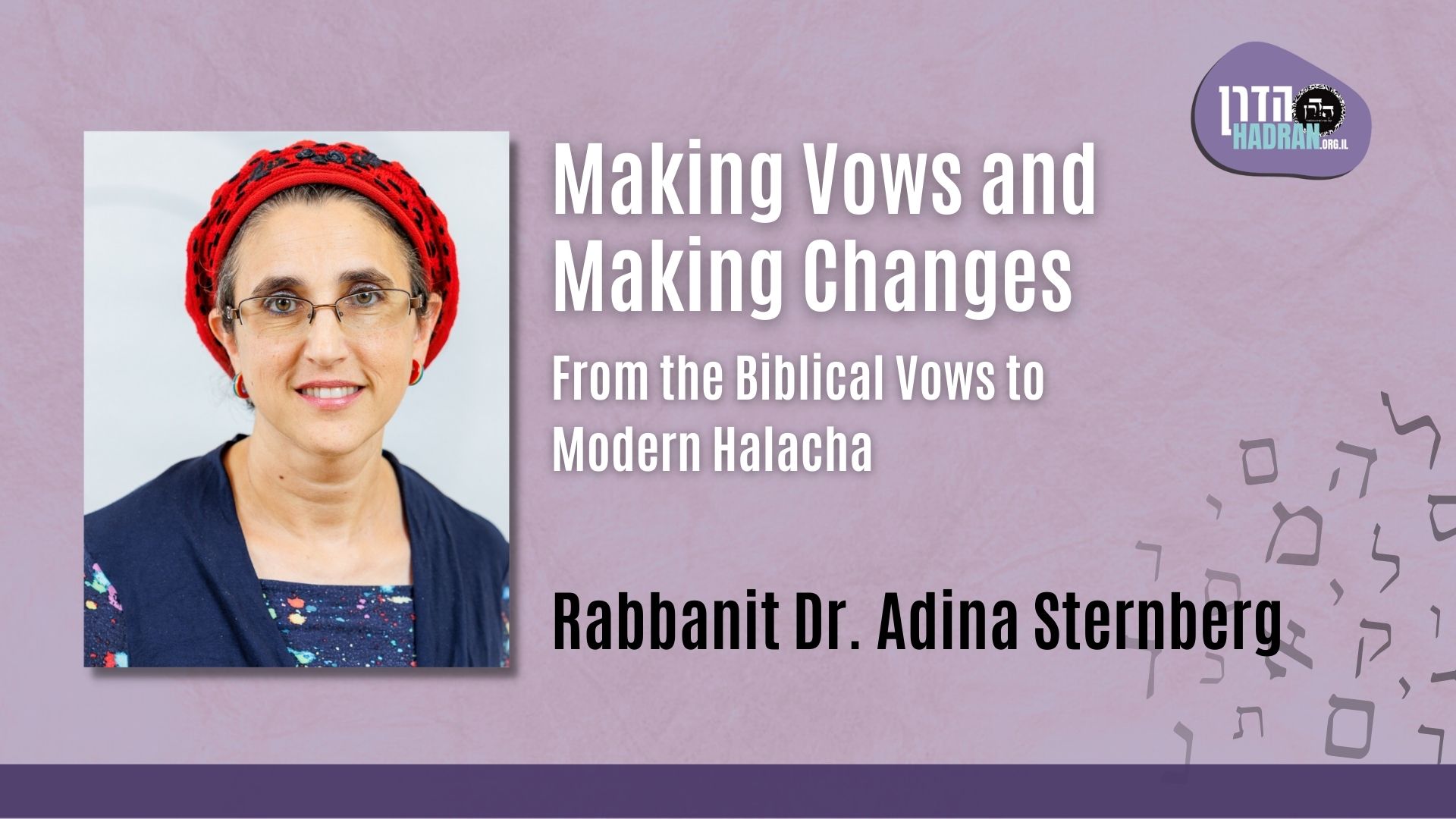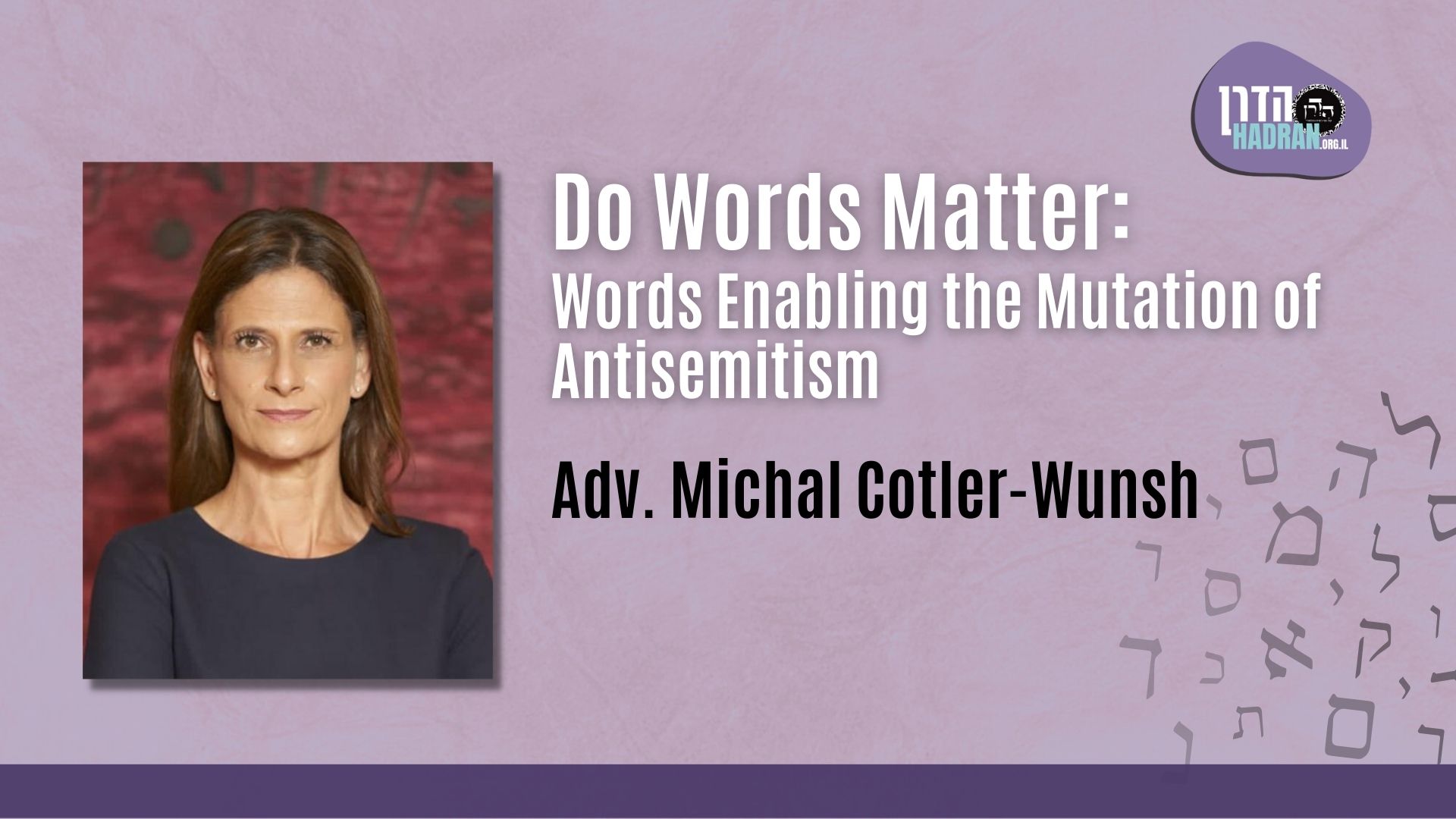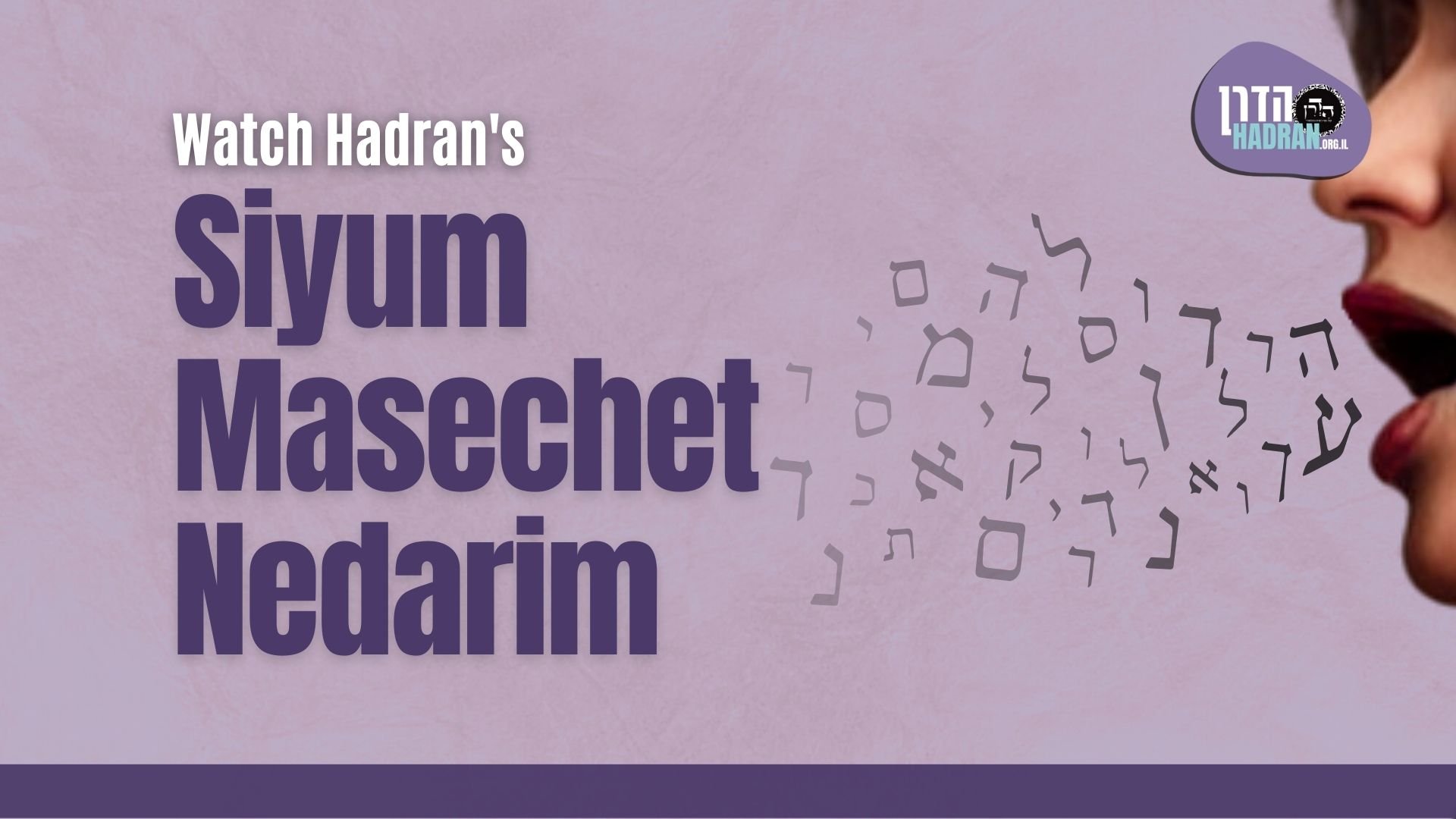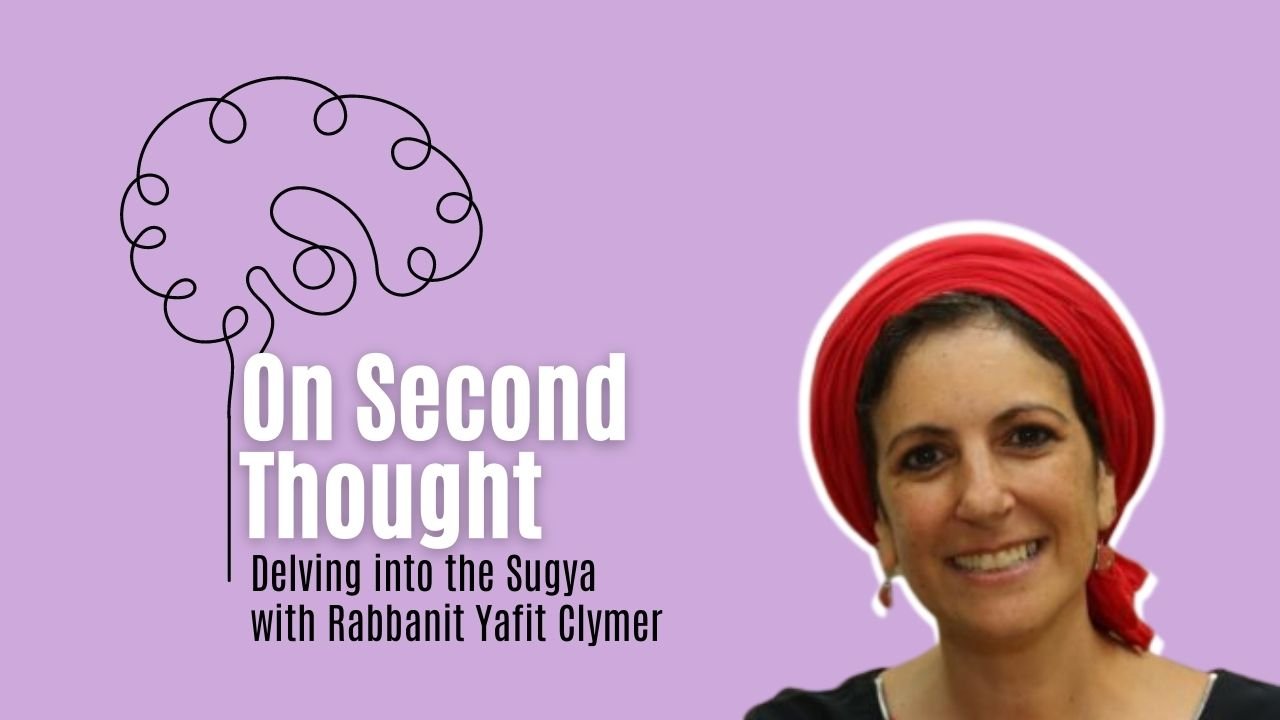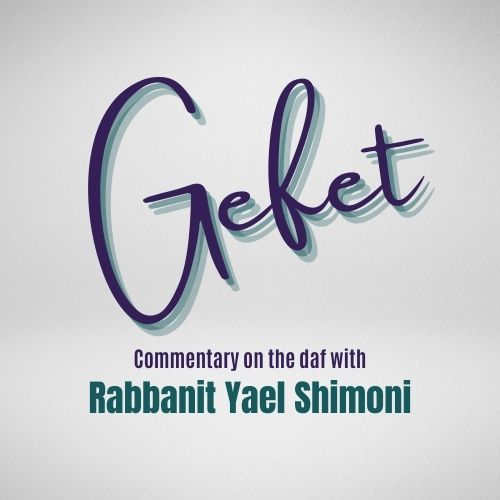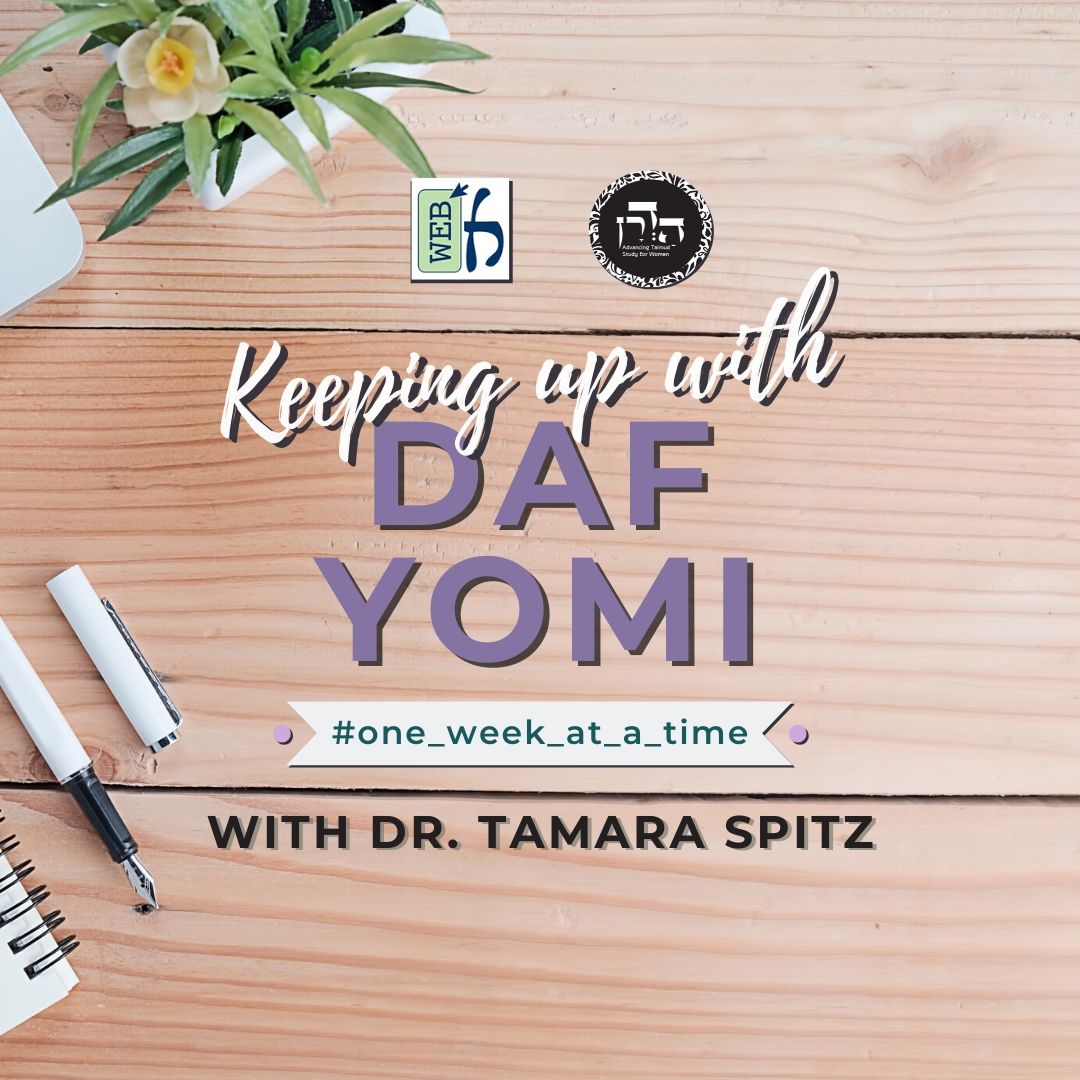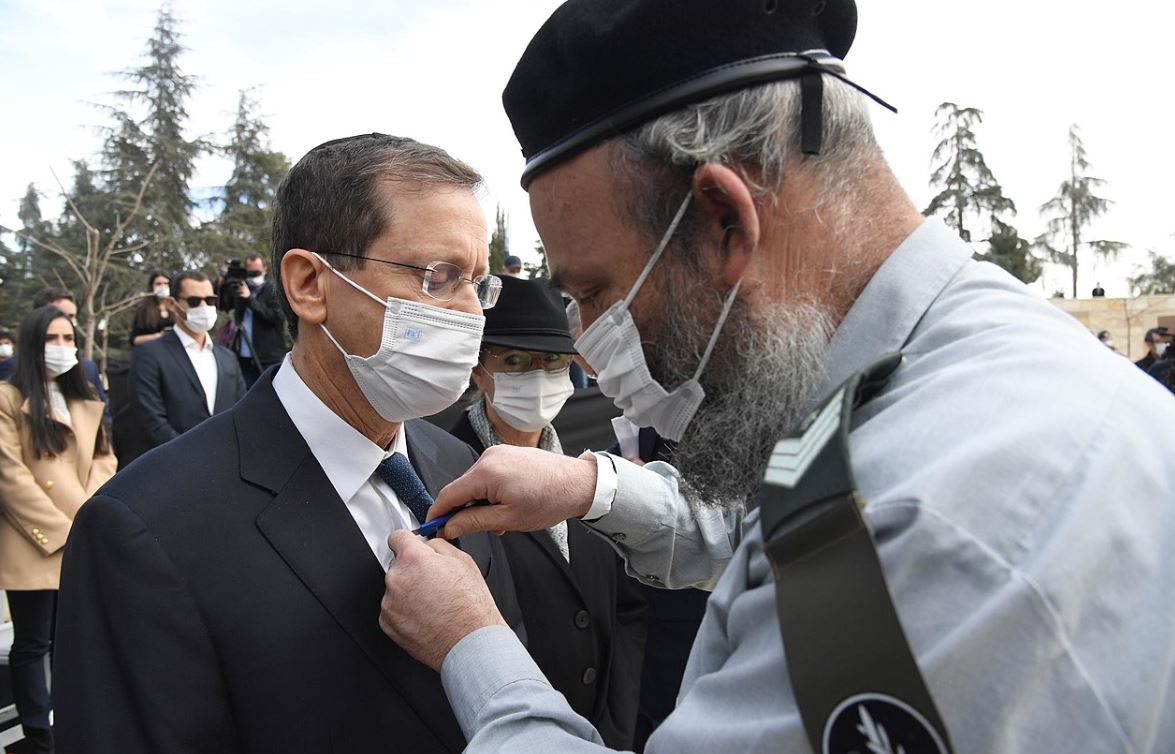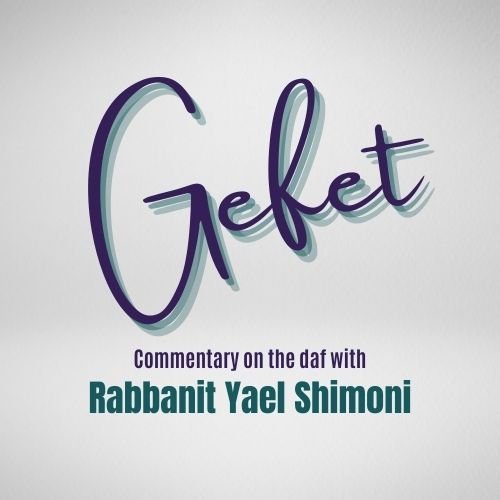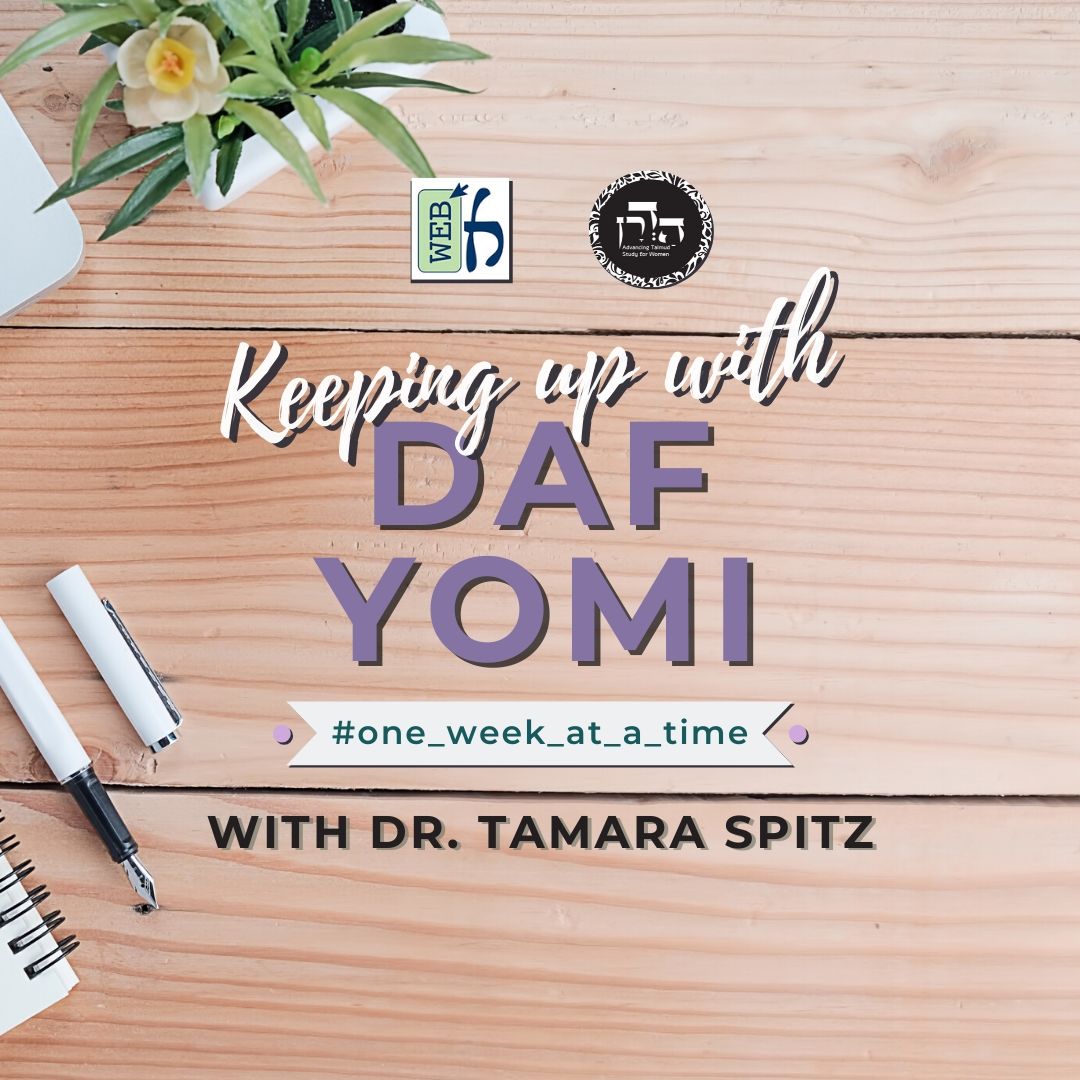Abaye holds that yadot (cut-off sentence) of a vow is considered a vow. The Gemara raises two difficulties against Abaye from braitot. The questions are each resolved in different manners. Rav Papa asks if yadot are effective in kiddushin, betrothal, or peah, designated a corner of your field for the poor. In what case is the question asked? No answer is given. Can we infer from the example brought for peah that one can make one’s entire field peah? Why is there deliberation regarding yadot for peah?
Nedarim 6
Share this shiur:
This week’s learning is sponsored for the merit and safety of Haymanut (Emuna) Kasau, who was 9 years old when she disappeared from her home in Tzfat two years ago, on the 16th of Adar, 5784 (February 25, 2024), and whose whereabouts remain unknown.
This week’s learning is dedicated of the safety of our nation, the soldiers and citizens of Israel, and for the liberation of the Iranian people. May we soon see the realization of “ליהודים היתה אורה ושמחה וששון ויקר”.
This week’s learning is sponsored for the merit and safety of Haymanut (Emuna) Kasau, who was 9 years old when she disappeared from her home in Tzfat two years ago, on the 16th of Adar, 5784 (February 25, 2024), and whose whereabouts remain unknown.
Want to dedicate learning? Get started here:


Today’s daily daf tools:
This week’s learning is sponsored for the merit and safety of Haymanut (Emuna) Kasau, who was 9 years old when she disappeared from her home in Tzfat two years ago, on the 16th of Adar, 5784 (February 25, 2024), and whose whereabouts remain unknown.
This week’s learning is dedicated of the safety of our nation, the soldiers and citizens of Israel, and for the liberation of the Iranian people. May we soon see the realization of “ליהודים היתה אורה ושמחה וששון ויקר”.
This week’s learning is sponsored for the merit and safety of Haymanut (Emuna) Kasau, who was 9 years old when she disappeared from her home in Tzfat two years ago, on the 16th of Adar, 5784 (February 25, 2024), and whose whereabouts remain unknown.
Today’s daily daf tools:
Delve Deeper
Broaden your understanding of the topics on this daf with classes and podcasts from top women Talmud scholars.
New to Talmud?
Check out our resources designed to help you navigate a page of Talmud – and study at the pace, level and style that fits you.
The Hadran Women’s Tapestry
Meet the diverse women learning Gemara at Hadran and hear their stories.
Nedarim 6
דְּאֵין אָדָם מְגָרֵשׁ אֶת אֵשֶׁת חֲבֵירוֹ, אֲבָל בְּעָלְמָא — מִי שָׁמְעַתְּ לְהוּ?
as a man does not divorce the wife of his fellow, so it is obvious that he is writing the bill of divorce to his wife. However, did you hear them state generally that ambiguous intimations are valid intimations?
מֵיתִיבִי: ״הֲרֵי הוּא עָלַי״, ״הֲרֵי זֶה [עָלַי]״ — אָסוּר, מִפְּנֵי שֶׁהוּא יָד לְקׇרְבָּן. טַעְמָא דְּאָמַר ״עָלַי״ — הוּא דְּאָסוּר, אֲבָל לָא אָמַר ״עָלַי״ — לָא. תְּיוּבְתָּא דְאַבָּיֵי!
The Gemara raises an objection based upon the following baraita: If one says with regard to an object lying before him: It is upon me, or: This is hereby upon me, it is forbidden, because it is an intimation that he is rendering the object forbidden to himself like an offering. This baraita indicates that the reason it is forbidden is that he specifically said: Upon me. However, if he did not say: Upon me, no, it is not forbidden, because this expression is an ambiguous intimation. This is a conclusive refutation of the opinion of Abaye, who holds that even ambiguous intimations are valid intimations.
אָמַר לָךְ אַבָּיֵי: טַעְמָא דְּאָמַר ״עָלַי״ — הוּא דְּאָסוּר. אֲבָל אָמַר ״הֲרֵי הוּא״, וְלָא אָמַר ״עָלַי״, ״הֲרֵי הוּא דְּהֶפְקֵר״ ״הֲרֵי הוּא דִּצְדָקָה״ קָאָמַר. וְהָא ״מִפְּנֵי שֶׁהוּא יָד לְקׇרְבָּן״ קָתָנֵי!
The Gemara answers: Abaye could have said to you that the reason it is forbidden is that he specifically said: Upon me. However, if he said: It is hereby, and did not say: Upon me, his statement is not considered an intimation of a vow at all, as he could have been saying: It is hereby ownerless property, or: It is hereby charity. The Gemara asks: But the baraita teaches that the object is forbidden because his statement is an intimation that he is rendering the object forbidden to himself like an offering. With regard to consecrating an offering, even the statement: This is, without the additional phrase: Upon me, is considered an intimation. Nevertheless, the baraita indicates that if one does not say: Upon me, the vow does not take effect. This must be because an ambiguous intimation is not a vow.
אֶלָּא אֵימָא: טַעְמָא דְּאָמַר ״עָלַי״ — הוּא אָסוּר וַחֲבֵירוֹ מוּתָּר, אֲבָל אָמַר ״הֲרֵי הוּא״ — שְׁנֵיהֶן אֲסוּרִין, דְּדִלְמָא ״הֲרֵי הוּא הֶקְדֵּשׁ״ קָאָמַר.
Rather, say the following: The reason is that he specifically said: Upon me; consequently, he is prohibited from benefiting from the object, but another person is permitted to benefit from it. However, if he said: It is hereby, and did not add the expression: Upon me, both of them are prohibited from benefiting from it because perhaps he is saying: It is hereby consecrated property. In other words, there is concern that he may have actually consecrated the object rather than taking a vow that it is forbidden to him as though it were consecrated.
מֵיתִיבִי: ״הֲרֵי זוֹ חַטָּאת״ ״הֲרֵי זוֹ אָשָׁם״, אַף עַל פִּי שֶׁהוּא חַיָּיב חַטָּאת וְאָשָׁם — לֹא אָמַר כְּלוּם. ״הֲרֵי זוֹ חַטָּאתִי״ ״הֲרֵי זוֹ אֲשָׁמִי״, אִם הָיָה מְחוּיָּב — דְּבָרָיו קַיָּימִין. תְּיוּבְתָּא דְּאַבָּיֵי!
The Gemara raises an objection to this on the basis of the following baraita: If one says: This is hereby a sin-offering, or: This is hereby a guilt-offering, then even if he is liable to bring a sin-offering or guilt-offering he has said nothing, as this is an ambiguous intimation. However, if he said: This is hereby my sin-offering, or: This is hereby my guilt-offering, then if he was liable to bring that offering his statement takes effect, because this is an obvious intimation. This is a conclusive refutation of the opinion of Abaye.
אָמַר לָךְ אַבָּיֵי: הָא מַנִּי — רַבִּי יְהוּדָה הִיא. וְהָא אַבָּיֵי הוּא דְּאָמַר: אֲנָא דַּאֲמַרִי — אֲפִילּוּ לְרַבִּי יְהוּדָה! הֲדַר בֵּיהּ.
The Gemara answers: Abaye could have said to you: In accordance with whose opinion is this baraita? It is in accordance with the opinion of Rabbi Yehuda, who holds that ambiguous intimations are not intimations. The Gemara asks: Wasn’t it Abaye who said: I say that ambiguous intimations are valid intimations even according to the opinion of Rabbi Yehuda? The Gemara answers: He retracted this statement and admitted that Rabbi Yehuda holds that ambiguous intimations are not valid intimations.
אֶלָּא לֵימָא, רָבָא דְּאָמַר כְּרַבִּי יְהוּדָה?
The Gemara asks: But shall we say that just as Abaye retracted his statement that his opinion can be stated even according to Rabbi Yehuda, Rava, who said that ambiguous intimations are not valid intimations, also retracted his initial statement and admitted that his opinion is only in accordance with the opinion of Rabbi Yehuda and is not in accordance with the opinion of the Rabbis?
אָמַר לָךְ רָבָא: אֲנָא דַּאֲמַרִי — אֲפִילּוּ לְרַבָּנַן. עַד כָּאן לָא קָאָמְרִי רַבָּנַן דְּלָא בָּעִינַן יָדַיִם מוֹכִיחוֹת אֶלָּא גַּבֵּי גֵּט, דְּאֵין אָדָם מְגָרֵשׁ אֶת אֵשֶׁת חֲבֵירוֹ. אֲבָל בְּעָלְמָא בָּעִינַן יָדַיִם מוֹכִיחוֹת.
The Gemara answers: Rava could have said to you: I say my statement even according to the opinion of the Rabbis. The Rabbis say that we do not require obvious intimations only with regard to a bill of divorce, as a man does not divorce the wife of his fellow, so it is obvious that he is writing the bill of divorce to his wife. However, generally we require obvious intimations.
בָּעֵי רַב פָּפָּא: יֵשׁ יָד לְקִידּוּשִׁין, אוֹ לָא? הֵיכִי דָמֵי: אִילֵימָא דְּאָמַר לַהּ לְאִשָּׁה ״הֲרֵי אַתְּ מְקוּדֶּשֶׁת לִי״, וְאָמַר לַחֲבֶירְתָּהּ ״וְאַתְּ נָמֵי״ — פְּשִׁיטָא הַיְינוּ קִידּוּשִׁין עַצְמָן! אֶלָּא כְּגוֹן דְּאָמַר לַהּ לְאִשָּׁה ״הֲרֵי אַתְּ מְקוּדֶּשֶׁת לִי״, וְאָמַר לַהּ לַחֲבֶירְתָּהּ ״וְאַתְּ״. מִי אָמְרִינַן ״וְאַתְּ נָמֵי״ אֲמַר לַהּ לַחֲבֶירְתָּהּ, וְתָפְסִי בַּהּ קִידּוּשִׁין לַחֲבֶירְתָּהּ, אוֹ דִּלְמָא: ״וְאַתְּ חֲזַאי״ אֲמַר לַהּ לַחֲבֶירְתַּהּ, וְלָא תָּפְסִי בָּהּ קִידּוּשִׁין בַּחֲבֶירְתַּהּ.
§ Rav Pappa raised a dilemma: Is there intimation for betrothal or not? Does betrothal take effect via an incomplete statement? The Gemara asks: What are the circumstances of such a case? If we say it is a case where one said to a woman: You are hereby betrothed to me, and he said to another woman: And you too, isn’t it obvious that this is betrothal itself, and it takes effect? Rather, it is a case where one said to a woman: You are hereby betrothed to me, and he said to another woman: And you. Do we say that he said the other woman: And you too are betrothed, and betrothal takes effect with regard to the other woman, or perhaps he said to the other woman: And you see that I am betrothing this woman, and betrothal does not take effect with regard to the other woman?
וּמִי מִיבְּעֵי לֵיהּ לְרַב פָּפָּא? וְהָא מִדַּאֲמַר לֵיהּ רַב פָּפָּא לְאַבָּיֵי: מִי סָבַר שְׁמוּאֵל יָדַיִם שֶׁאֵין מוֹכִיחוֹת הָוְיָין יָדַיִם, מִכְּלָל דִּסְבִירָא לֵיהּ לְרַב פָּפָּא דְּיֵשׁ יָד לְקִידּוּשִׁין! חֲדָא מִגּוֹ מַאי דִּסְבִירָא לֵיהּ לִשְׁמוּאֵל אֲמַר לֵיהּ לְאַבָּיֵי.
The Gemara asks: Did Rav Pappa raise this as a dilemma? But from the fact that Rav Pappa said to Abaye in a case concerning betrothal (see Kiddushin 5b): Does Shmuel hold that ambiguous intimations are valid intimations, it can be proven by inference that Rav Pappa holds that there is intimation for betrothal. The Gemara answers: Rav Pappa spoke to Abaye about one of the opinions that Shmuel held. Shmuel had ruled that even an ambiguous intimation was sufficient in the case of betrothal, and Rav Pappa questioned this ruling without expressing his own opinion that even obvious intimations are not valid with regard to betrothal.
בָּעֵי רַב פָּפָּא: יֵשׁ יָד לְפֵאָה, אוֹ אֵין יָד לְפֵאָה? הֵיכִי דָמֵי: אִילֵימָא דְּאָמַר ״הָדֵין אוּגְיָא לֶיהֱוֵי פֵּאָה, וְהָדֵין נָמֵי״ — הָהִיא פֵּיאָה מְעַלַּיְיתָא הִיא. כִּי קָא מִיבַּעְיָא לֵיהּ, כְּגוֹן דְּאָמַר ״וְהָדֵין״ וְלָא אָמַר ״נָמֵי״, מַאי?
§ Rav Pappa raised another dilemma: Is there intimation for pe’a, the produce in the corner of a field that must be left for the poor, or is there no intimation for pe’a? The Gemara asks: What are the circumstances of the case? If we say it is a case where one said: This furrow [ugeya] shall be pe’a and this one too, this is a full-fledged declaration of pe’a. The Gemara explains: He raises the dilemma with regard to a case where he said: And this, and he did not say: And this one too, and therefore his statement can be interpreted to mean that this other furrow should remain his and not be included in the pe’a (Tosafot). What is the halakha in this case?
מִכְּלָל, דְּכִי אָמַר ״שָׂדֶה כּוּלָּהּ תֶּיהְוֵי פֵּאָה״, הָוְיָא פֵּאָה?
The Gemara interrupts this train of thought and wonders: Does this prove by inference that in a case where one said: The entire field shall be pe’a, it would all be rendered pe’a? The case must be one where the first furrow was large enough to serve as pe’a for the entire field, because if that were not the case, it would be clear that he meant that the second furrow should also be pe’a. Consequently, it is clear from Rav Pappa’s question that one can designate as pe’a a larger portion of the field than one is absolutely required to designate.
אִין, וְהָתַנְיָא: מִנַּיִן שֶׁאִם רוֹצֶה לַעֲשׂוֹת כׇּל שָׂדֵהוּ פֵּאָה — עוֹשֶׂה, תַּלְמוּד לוֹמַר: ״פְּאַת שָׂדְךָ״.
The Gemara answers: Yes, and it is taught in the following baraita: From where is it derived that if one wants to render his entire field pe’a, he may do so? The verse states: “You shall not wholly reap the corner of your field” (Leviticus 19:9). This is expounded to mean that the entirety of “your field” may be designated as the “corner” that is left for the poor.
מִי אָמְרִינַן: כֵּיוָן דְּאִיתַּקַּשׁ לְקׇרְבְּנוֹת; מָה קׇרְבָּנוֹת יֵשׁ לָהֶם יָד, אַף פֵּאָה יֵשׁ לָהּ יָד. אוֹ דִלְמָא: כִּי אִיתַּקַּשׁ — לְ״בַל תְּאַחֵר״ הוּא דְּאִיתַּקַּשׁ. וְהֵיכָא אִיתַּקַּשׁ? דְּתַנְיָא:
The Gemara returns to its discussion of Rav Pappa’s dilemma. Do we say that since pe’a is juxtaposed to offerings, just as offerings have intimation, so too, pe’a has intimation? Or perhaps when pe’a is juxtaposed to offerings, it is juxtaposed to indicate only that it is subject to the prohibition: You shall not delay? The Gemara clarifies: And where is it juxtaposed? As it is taught in a baraita:


